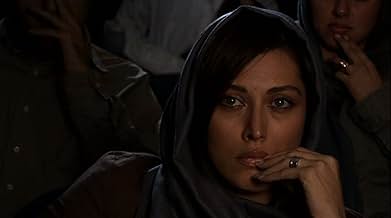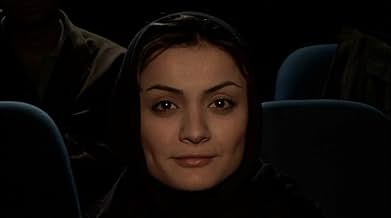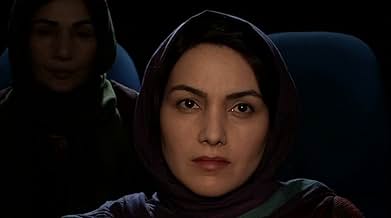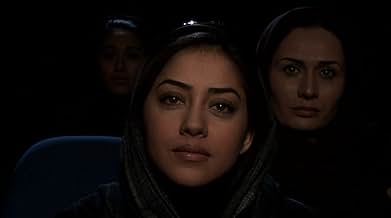Shirin
- 2008
- Tous publics
- 1h 32min
NOTE IMDb
6,7/10
3 k
MA NOTE
Ajouter une intrigue dans votre langueWomen's expressions are captured as they watch Khosrow and Shirin, a 12th-century Persian play staged by Kiarostami, revealing their reactions to the unseen narrative.Women's expressions are captured as they watch Khosrow and Shirin, a 12th-century Persian play staged by Kiarostami, revealing their reactions to the unseen narrative.Women's expressions are captured as they watch Khosrow and Shirin, a 12th-century Persian play staged by Kiarostami, revealing their reactions to the unseen narrative.
- Réalisation
- Scénario
- Casting principal
- Récompenses
- 1 nomination au total
Zar Amir Ebrahimi
- Woman in audience
- (as a different name)
Vishka Assayesh
- Woman in audience
- (as Vishka Asayesh)
Avis à la une
It's like reading the book of this mythological tale of Khosrow and Shirin's love from the expressions on the faces of the women watching the movie instead of plainly watching the movie itself.
So creative, so extraordinary, so poetic, so emotional, so fantastic...
Just as a note, there is a different but partly similar version of this old tale told in Turkey for ages known as "Ferhat and Sirin" in that Ferhat is stipulated to dig long channels and tunnels on the rocky mountains to bring water to the palace of the sultan as a precondition to marry with his doughter Sirin. Remains of some channels and tunnels in the city of Amasya is shown as a proof of this mythological love.
So creative, so extraordinary, so poetic, so emotional, so fantastic...
Just as a note, there is a different but partly similar version of this old tale told in Turkey for ages known as "Ferhat and Sirin" in that Ferhat is stipulated to dig long channels and tunnels on the rocky mountains to bring water to the palace of the sultan as a precondition to marry with his doughter Sirin. Remains of some channels and tunnels in the city of Amasya is shown as a proof of this mythological love.
Filmmakers like David Lynch or early Darren Aronofsky (Pi) have been branded as experimental, extreme, uncommercial. Okay, so their work is occasionally difficult, but at least they know how to reach out to the audience. Abbas Kiarostami's Shirin, on the other hand, gives a new definition to the adjective "experimental", its style being so radical no marketing campaign in the world would be able to endorse it outside a film festival like Venice (which is where I saw the film).
Kiarostami, always a festival favorite, has truly gone where no man's ever been before with his adaptation of a classic Persian story from the twelfth century. The predictably sad tale revolves around a woman, Shirin, and her being coveted by two different men. A yarn as old as humanity, most will say. What can the director do to make it fresh and original?
The answer is of the most audacious kind: instead of doing a straightforward movie, Kiarostami chose to film a stage version of the story, with a twist - we never actually see what happens on the stage. The whole 90-minute bulk of the film consists of a series of close-ups of over a hundred Iranian women (plus Juliette Binoche in a three-shot cameo) who are watching the play. All the action takes place off-camera, with voices and sounds allowing us to imagine what we should be looking at.
With such an unconventional approach, Shirin is very simple and at the same time quite difficult. Few, if any, average moviegoers will choose it over something more traditional, and those who do will almost certainly find it boring. That's a pity, because the extreme style does serve a point, although it isn't entirely clear at first. The key to understanding the picture lies in focusing only on the actresses' faces: the minute one stops paying attention to the soundtrack (I was helped in that by the fact that the subtitles were faulty and didn't show up until 40 seconds after the lines had been spoken), it becomes easier to appreciate the simple beauty of Kiarostami's choice and feel a kind of empathy with those women, as if they were the real protagonists (and in a way, they are).
So yes, Shirin is perhaps the most uncommercial film that will ever have been made, but since when does that translate as "unwatchable"? It's an acquired taste, for sure, but after the initial wave of frustration it might be possible to feel a more positive emotion kick in.
Kiarostami, always a festival favorite, has truly gone where no man's ever been before with his adaptation of a classic Persian story from the twelfth century. The predictably sad tale revolves around a woman, Shirin, and her being coveted by two different men. A yarn as old as humanity, most will say. What can the director do to make it fresh and original?
The answer is of the most audacious kind: instead of doing a straightforward movie, Kiarostami chose to film a stage version of the story, with a twist - we never actually see what happens on the stage. The whole 90-minute bulk of the film consists of a series of close-ups of over a hundred Iranian women (plus Juliette Binoche in a three-shot cameo) who are watching the play. All the action takes place off-camera, with voices and sounds allowing us to imagine what we should be looking at.
With such an unconventional approach, Shirin is very simple and at the same time quite difficult. Few, if any, average moviegoers will choose it over something more traditional, and those who do will almost certainly find it boring. That's a pity, because the extreme style does serve a point, although it isn't entirely clear at first. The key to understanding the picture lies in focusing only on the actresses' faces: the minute one stops paying attention to the soundtrack (I was helped in that by the fact that the subtitles were faulty and didn't show up until 40 seconds after the lines had been spoken), it becomes easier to appreciate the simple beauty of Kiarostami's choice and feel a kind of empathy with those women, as if they were the real protagonists (and in a way, they are).
So yes, Shirin is perhaps the most uncommercial film that will ever have been made, but since when does that translate as "unwatchable"? It's an acquired taste, for sure, but after the initial wave of frustration it might be possible to feel a more positive emotion kick in.
"Shirin" has not been released on DVD in Brazil and I was lured by the IMDb User Rating (7.0/10 with 464 votes) and three favorable reviews (one guy with 4 reviews, another with 6 reviews and one with 952 reviews) published by IMDb. Conclusion: I bought the imported DVD released by Cinema Gould distributor, with subtitles in English.
Unfortunately I was not able to see more than fifteen minutes of this annoying and pretentious recitation of a Persian poem showing the faces of Iranian women in the audience of a movie theater while they watch on the screen. Then I took a nap and I was not brave enough to rewind the film.
"Shirin" might be an interesting short, but NEVER a feature. Fans of Abbas Kiarostami may like "Shirin", but that is not my case; actually I hated it, since it gave me the sensation of being backwards to the screen snooping the audience. Probably Godard might be jealous for not thinking of such boring experimental cinema before. My vote is one (awful).
Title (Brazil): Not Available
Unfortunately I was not able to see more than fifteen minutes of this annoying and pretentious recitation of a Persian poem showing the faces of Iranian women in the audience of a movie theater while they watch on the screen. Then I took a nap and I was not brave enough to rewind the film.
"Shirin" might be an interesting short, but NEVER a feature. Fans of Abbas Kiarostami may like "Shirin", but that is not my case; actually I hated it, since it gave me the sensation of being backwards to the screen snooping the audience. Probably Godard might be jealous for not thinking of such boring experimental cinema before. My vote is one (awful).
Title (Brazil): Not Available
The background story is an ancient Persian tragic romance that involves the Queen to be of Armenia, Shirin and the King of (neo)-Persia Khosrow. However, this is not the story we see. The movie is filmed in a theater and we see the faces of women watching the romance unfold on screen.
A very interesting outlook on cinema, narratives and emotions altogether, if one thing for sure it is that Shirin is not your typical movie and you are most likely going to be quite surprised by it. Although all of the audience are part of the Iranian cinema industry (with the exception of the renowned French actress Juliette Binoche), there is no particular focus on anyone and the film seems to jump from face to face in accordance to the emotions depicted.
It is quite interesting to see the differences, for example when someone cries during a scene, others might bite their finger or play with their hair. It reflects back at the spectator who might at the time do the exact same and a certain bond can or can not be formed. There are all sorts of reactions, the shock, the fear are both displayed and experienced differently. Some will, for example in a scene which most likely involves a battle, close their eyes, put their hand on their forehead or become very still. In addition to the biting fingers, some women also readjust their hijab and leaving us wondering if and why watching those scenes disturbs them so.
There were men in the audience and one could wonder why no shots focused on them. I wondered about this myself and it puzzled me, though perhaps it may be that the story being told is a warning to women about love. Also, the title is Shirin, not Shirin and Khosrow, which I guess would imply that the focus is on the part of the woman in the tragedy.
I have to admit that I would probably have enjoyed seeing the film that was being shown more than the expressions of the audience. Of course, it was quite an experience and an exposure to a vast palette of emotions, but I feel emotions are such a personal thing that they might be better enjoyed at the first degree, when they are still raw. I can easily assume that this would be very different from a viewer to another and one can relate more to faces describing an emotion than a situation.
I liked: A different outlook on movies. Womanly, in a way, as I wouldn't quite call it a feminist film. Background historical tale.
I disliked : Feels a little like watching a recycled movie at times, digested by others. Really puzzling at times it is quite impossible to understand what goes on on the screen, maybe it is intended that way, but it did bother me.
64/100 A very particular film, it felt like going to a theatrical performance of an old Greek tragedy and standing on the scene watching others watch it unfold. It feels really artsy.
A very interesting outlook on cinema, narratives and emotions altogether, if one thing for sure it is that Shirin is not your typical movie and you are most likely going to be quite surprised by it. Although all of the audience are part of the Iranian cinema industry (with the exception of the renowned French actress Juliette Binoche), there is no particular focus on anyone and the film seems to jump from face to face in accordance to the emotions depicted.
It is quite interesting to see the differences, for example when someone cries during a scene, others might bite their finger or play with their hair. It reflects back at the spectator who might at the time do the exact same and a certain bond can or can not be formed. There are all sorts of reactions, the shock, the fear are both displayed and experienced differently. Some will, for example in a scene which most likely involves a battle, close their eyes, put their hand on their forehead or become very still. In addition to the biting fingers, some women also readjust their hijab and leaving us wondering if and why watching those scenes disturbs them so.
There were men in the audience and one could wonder why no shots focused on them. I wondered about this myself and it puzzled me, though perhaps it may be that the story being told is a warning to women about love. Also, the title is Shirin, not Shirin and Khosrow, which I guess would imply that the focus is on the part of the woman in the tragedy.
I have to admit that I would probably have enjoyed seeing the film that was being shown more than the expressions of the audience. Of course, it was quite an experience and an exposure to a vast palette of emotions, but I feel emotions are such a personal thing that they might be better enjoyed at the first degree, when they are still raw. I can easily assume that this would be very different from a viewer to another and one can relate more to faces describing an emotion than a situation.
I liked: A different outlook on movies. Womanly, in a way, as I wouldn't quite call it a feminist film. Background historical tale.
I disliked : Feels a little like watching a recycled movie at times, digested by others. Really puzzling at times it is quite impossible to understand what goes on on the screen, maybe it is intended that way, but it did bother me.
64/100 A very particular film, it felt like going to a theatrical performance of an old Greek tragedy and standing on the scene watching others watch it unfold. It feels really artsy.
Kiarostami has proved here that one can reach the truth of cinema by the most direct route, to examine the faces of the women members of a film audience while they watch, an unseen to us, film of the great 12th century Persian epic poem, 'Khosrow and Shirin' Kiorstami's slow tracking camera traces the faces of 114 famous Iranian actresses and one famous French actress. Despite the potential for a forensic piece, the work is in fact a poetic study of the feminine face that recognises the emotional as well as intellectual process involved in watching a film. We are caught in a kind of mise en abyme of spectatorship and although we are never given the opportunity to see the film these faces respond to we are, nevertheless, caught in the narrative of the romantic epic, the faces themselves display the richness and complexity of a reading; tears, smiles, quizzical glances, the turning away through lowered lids, all of these responses combine to form a group portrait as symphonic construction. It may sound like watching paint dry but in fact the film is a welcome relief from the kind of action cinema that has become a numbing experience in contemporary cinema. The chance to see beauty is rare in cinema today, here we are allowed time to relish the female face. We might see this film as returning us to the early cinema of Hollywood that rejoiced in the first truly cinematic rhetorical trope, the close-up. In this sense 'Shirin' is a triumphant celebration of cinema itself.
Le saviez-vous
- AnecdotesAccording to some reports, the women were filmed individually in Kiarostami's living room, with the director asking them to cast their gaze at a mere series of dots above the camera.
- ConnexionsReferenced in Taste of Shirin (2008)
Meilleurs choix
Connectez-vous pour évaluer et suivre la liste de favoris afin de recevoir des recommandations personnalisées
- How long is Shirin?Alimenté par Alexa
Détails
Box-office
- Montant brut mondial
- 26 302 $US
- Durée
- 1h 32min(92 min)
- Couleur
- Mixage
- Rapport de forme
- 1.85 : 1
Contribuer à cette page
Suggérer une modification ou ajouter du contenu manquant



































